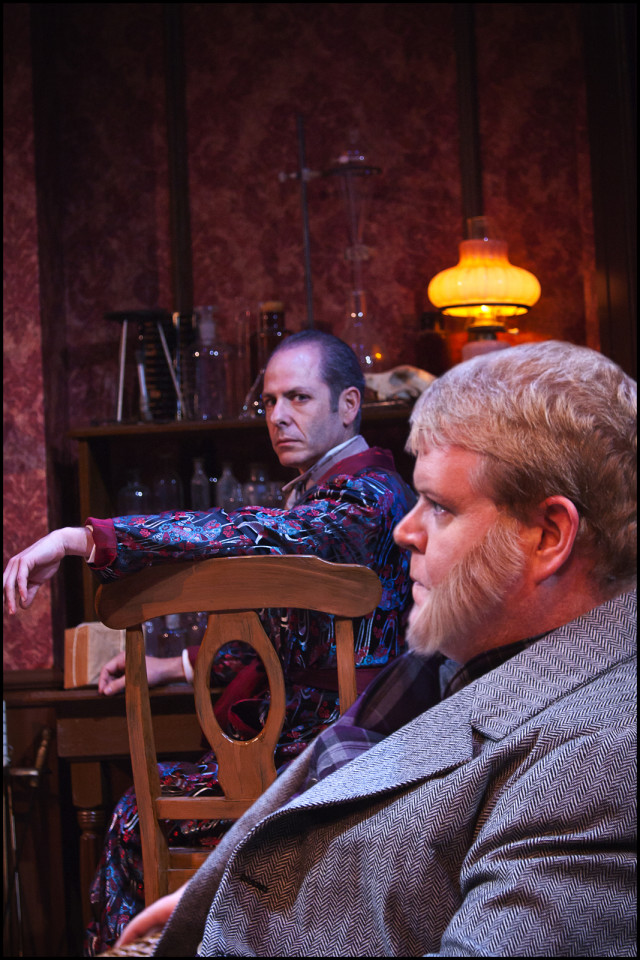Review: Sherlock Holmes and the Case of the Christmas Carol

In Artist Rep’s rendition, Sherlock = Scrooge and Watson = Bob Cratchit.
This time last year, when A Christmas Story bumped A Christmas Carol from the PCS main stage, Culturephile ran through the relative merits of Scrooge v Ralphie. Now, Artists Repertory Theatre offers another substitute for Scrooge: Mr. Sherlock Holmes. In Seattle playwright John Longenbaugh’s rewrite of the Dickens classic, the great London detective paces his smoke-stained flat in his elegant brocade dressing-gown, then gets a moral come-uppance from the requisite three ghosts and a host. The stand-in for Bob Cratchit is Doctor Watson, and as for Tiny Tim: there isn’t one.
This kind of creative choice, intended to “shake up” cliches, also runs the risk of messing up tried-and-true classics. Ironically, while Artists Rep and Stumptown Stages opt for adventurous Carol variations and PCS continues to favor Midwest moppet Ralphie, 2011 would’ve been a prime season to stage the original Dickens tale. The current “Occupy” climate of rich-poor polarity would ring all too true for modern Americans, and Scrooge’s “Are there no prisons? No workhouses?” talking points could be pulled straight from the teleprompters at FOX News. Would that the Ghost of Christmas Yet To Come had whispered in the ears of these theater companies before they opted to flip the script.
Watching Case, one can’t help but revisit what makes Carol tick: Scrooge emerges as an obvious villain who’s clearly at fault for current and future ills in his community. As we watch him review his own fairly universal nostalgias and regrets, we see him as an increasingly contrite and sympathetic pilgrim. We learn that if Scrooge weren’t a greedy workaholic, he wouldn’t have broken Belle’s heart. He’d have matured as a married (implied, happier) man. And if he changes his ways even now, he can still save Bob Cratchit’s faith and Tiny Tim’s life. We, the audience, are unanimous about Scrooge’s next moral step, and tremendously relieved to watch him take it.
But with Holmes in the hot seat, the ideology is far murkier. Longenbaugh’s admittedly crisp and elegant dialogue nevertheless sends Scrooge up on some nebulous, conflicting, and petty claims.
SHERLOCK’S “SINS”
~He’s too analytical to be sympathetic, stating, “People are puzzles and problems, nothing more,” and “Imagination and fancy can cause more damage than a match in a munitions store.” The ghost of Christmas present censures him thus: “There is nothing so dull as a man who only traffics in sharp observations.” No matter that this trait is what enables his famous deductions.
~He’s quit his usual detective practice to conduct chemistry experiments. Since when was changing one’s course of study considered dereliction? (Nobody tell James Franco .)
~He refuses to help exonerate a local clerk who has been falsely accused of theft, because another detective is already working the man’s case. Monsterous!
~He insults Christmas, calling it “the thoughtless exchanging the unnecessary.” Okay, that’s pessimistic. Still….
~He faked his own death and went globetrotting for three years, which we are made to understand was—at the very least—a rude and dishonest thing to do to his partner Watson. That said, Watson doesn’t seem to have suffered too keenly, and Holmes likely used his travels to gather new scientific insight.
Where Scrooge was a heartless oligarch willing to let Tiny Tim die crippled in the streets, Holmes is merely an antisocial-yet-effective intellectual who leads an austere and private life, holing up to solve the conundrums of chemistry. Is that really bad enough to spark supernatural intervention?
If their rap-sheets bore equal shame, then Sherlock would work fine as a Scrooge stand-in. As it is, the comparison feels a bit forced. Where modern Scrooges abound in the form of corrupt corporate CEO’s, who would qualify as modern Holmeses? Drug researchers? CSI’s? Doctor Gregory House? Characters who, despite slightly blunted empathy centers, are nevertheless on a valuable path of inquiry for a greater social good. Are their actions flat-out wrong? It’s a hard case to make. Further credibility is lost for Longenbaugh as we watch a character who is known to demand hard evidence abruptly swap his skepticism for an unquestioning acceptance of the ghostly apparitions in his midst.
Those who can coast through the holes in the play’s premise will be regaled by exquisitely acted characters, witty writing, a lush Victorian aesthetic, and even a steam-punk-style train car. This audience will no doubt resent the above analysis as much as Holmes’ cheerless clinking of beakers. They might even haunt Culturephile with admonitions, not realizing that the critique comes from an unfulfilled wish to be emotionally moved by a narrative that doesn’t fully deliver. For them, director Jon Kretzu’s notes summarize the more general grounds on which the play can be appreciated: “Are there any two fictional characters more real in our hearts and minds than Sherlock Holmes and Ebenezer Scrooge? We offer up this theatrical holiday greeting to you with a wish to celebrate the Sherlock and Scrooge that live within us all.”
In other words, it’s rude to overanalyze a heartfelt holiday gesture. Better to arrange these two beloved English figures between the candles on your mantle and admire them with a misty eye.
Sherlock Holmes and the Case of the Christmas Carol continues through December 24. For more about Portland arts events, visit PoMo’s Arts & Entertainment Calendar, stream content with an RSS feed, or sign up for our weekly On The Town Newsletter!




